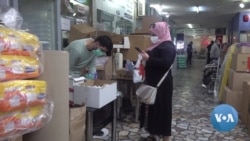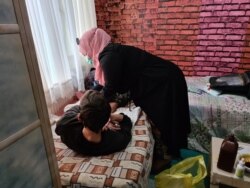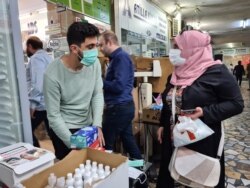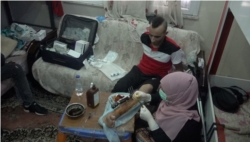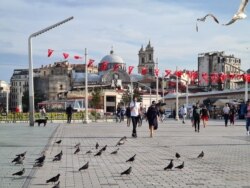Twenty-eight-year-old Khalid Khalifa, a Syrian refugee in Turkey, lies on a cot, unable to stand. He is paralyzed from the waist down and gaping bedsores on the back of his legs and buttocks ooze infected pus.
In a pink hijab and a surgical mask, nurse Reem Srour, 36, leans over the wounds, inserting gauze soaked in betadine.
Srour doesn’t work for a hospital or an aid organization. She is a one-person traveling medical unit, treating some of the city’s poorest and most vulnerable people at a time when, for many people, hospitals are not an option.
“They can’t go to the hospital,” she says later that day in a mostly closed outdoor shopping center. Some refugees do not have their papers in order. Others cannot afford care or fear getting the coronavirus at a hospital.
“And the hospitals are not accepting everybody,” she adds. “They are accepting only the critical cases.”
Srour, a refugee herself, lived and worked as a nurse in a surgical field hospital in Syria for a year before she fled the war. She cannot go home because she treated rebel soldiers in an area that is now controlled by the government.
Every day she visits five to eight patients. Most are refugees and all are desperately poor. Friends and neighbors help her pay for medical supplies and a few young activists take turns driving her.
Khalifa, her patient, built furniture for a living when Syria’s war began in 2011. Five years later, he was shot in the back and in the hand while fighting with the Free Syrian Army, a rebel group. Other fighters pulled him through a half kilometer of water pipes to save his life.
Now he lives with his brothers in a tiny Istanbul apartment. Before Srour found him, he wasn’t getting treatment and his bedsores were deepening.
“Four months ago the doctor used to visit me,” he says, sitting up in his cot. “But now it’s not possible.”
Fear and lacking
In a room crowded with bunk beds on the other side of town, Kareem Sammoudi, 31, takes shelter with other young men after returning from a failed attempt to travel to Greece.
A few weeks ago, he managed to cross the border, but before he could file for asylum, he was shot in the leg on the street by a stranger. A local hospital treated his wounds by inserting metal rods into his legs. But, he says, authorities also confiscated everything he had before dumping him on the other side of the border.
He couldn’t walk, he adds, so he crawled on his stomach for days before finding a ride to Istanbul. By the time he arrived here, his wounds were infected.
“How could I go to the hospital with nothing?” he says. “They took my money, passport, documents. I have nothing left.”
Turkey hosts 3.6 million Syrian refugees, more than any other country in the world, and Istanbul is its biggest city, with 16 million people. Since the pandemic came to Turkey in March, most refugees who were working have lost their jobs. Many, like Sammoudi, also have no documents with which to claim state benefits.
As Sammoudi tells his story, Srour slowly scrapes infected skin away from the rods in his leg with a knife, while a young activist assists her by holding up a mobile phone light. Many other people in similar circumstances have no access to care at all, she says.
“I know that a lot of people … didn’t know that I’m here to help,” she explains. And even if they did, she adds, she couldn’t treat them all.
“I think a lot of people are in need.”
Shadi Turk contributed to this report.




